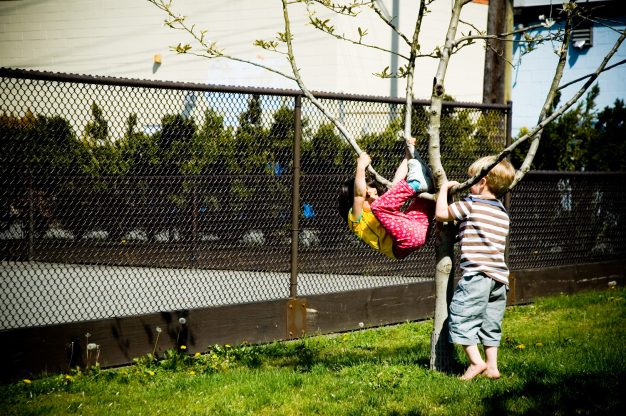
Uncertain future for family-friendly housing co-ops
In this first part of the final article of her “Cities for Families” series, showcasing how local governments, non-profits and the private sector are building a family friendly Vancouver, Jillian Glover spotlights the challenges facing the city’s in-demand housing co-operatives.
Imagine living in a place where you know all of your neighbours and have weekly dinners together; you leave your front door open in the evenings; your children play freely in a shared courtyard; your rent is affordable; and your housing is secure. This is the lifestyle for residents of Vancouver’s First Avenue Athletes Village Housing Co-operative.
“When I moved here, I found a stable home that I could afford in a walkable neighborhood that I share with a supportive community,” Yuri Artibise, a director of the Co-operative Housing Federation of British Columbia and resident at the Co-op. “The combination of people, place and price make it hard to think of living anywhere else.”
The Athlete’s Village Housing Co-op provides 84 homes in Vancouver’s Olympic Village neighbourhood. It was created in 2012 by the City of Vancouver and the Co-operative Housing Federation of BC with a mortgage from Vancity, a local credit union, to help cover a 60-year lease on the land and building.
Security of tenure
Athlete’s Village is one of the 2,220 housing co-operative associations across Canada. A housing co-operative – or “co-op” – is a multi-unit housing property owned by its residents. Co-op members have security of tenure, which means they can live in their home for as long as they wish. They are safe from being evicted due to landlords selling or renovating the property – a growing problem in Vancouver.
There is no landlord. Members work together to keep their housing well-managed and affordable
They also own their homes co-operatively with their neighbours, forming a community that works together to manage the co-op. Like homeowners, they have a say in decisions that affect their home. According to Yuri, “People living in co-op housing are members and are responsible for the co-op. There is no landlord. As members, they elect a board of directors to manage co-op business and work together to keep their housing well-managed and affordable”.

![]()
![]()
![]()
![]() Demand exceeding supply
Demand exceeding supply
According to CMHC, having co-op residents involved in decision-making gives them dignity and pride in their homes. For example, they are more likely to take care of their units and common spaces. Higher tenant
satisfaction leads to a more stable tenant population and reduced operating expenses, which helps the co-op remain an attractive, liveable residence.
Affordable stable homes with solid community support make co-op housing highly desirable for families – 62% of housing co-op units are occupied by parents with children. However, demand for co-op housing is rapidly exceeding the available supply, and the future of co-ops in Canada is still unclear.
(to be continued)
Jillian Glover
Main photo: pjkchan
Inset photo: This City Life
Blog first published on This City Life




